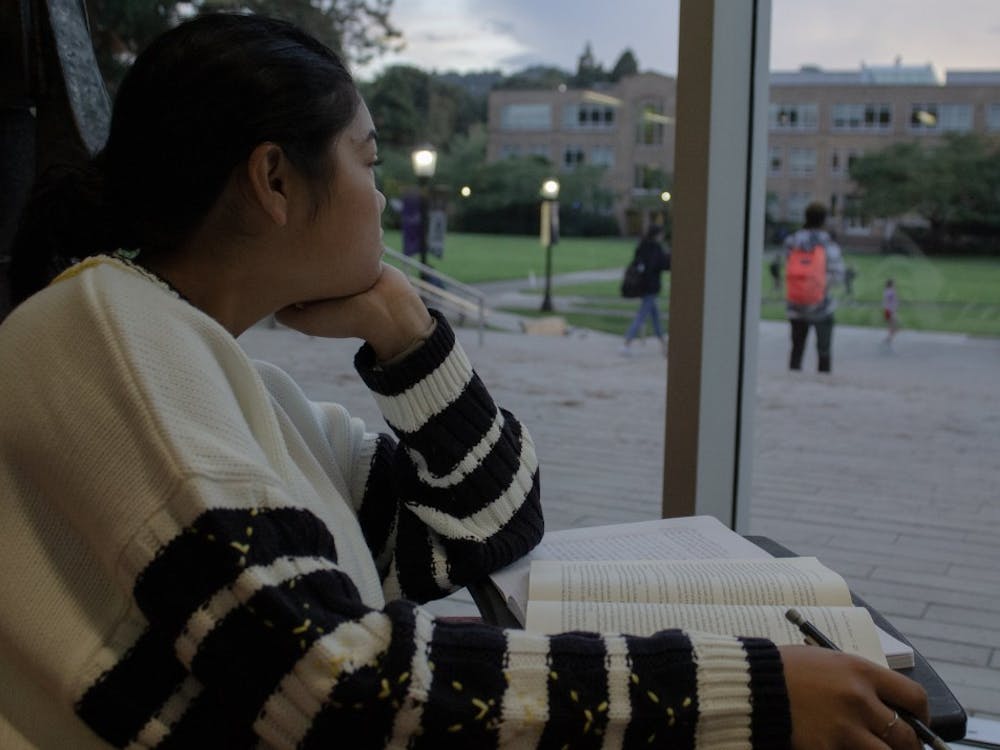I've been known to pull an all-nighter here and there. Okay — many all-nighters. For me, it seems like this phenomenon is always driven by two things: poor time management and procrastination. These two villains often make it seem like I have no choice but to forgo my sweet slumber and stay up all night.
I distinctly remember a time during sophomore year that I had to cram and pull an all-nighter. It went like this: I'm squinting at my computer screen frantically trying to copy the entire semester of notes in preparation for a final. The hours seem to fly by, and before I know it, the sun starts to peek into my window. The place where my brain used to be is now filled with a dense fog that makes it difficult to function like a normal human being. I stumble around my dorm room with bleary eyes, somehow make it down the hall, and get into the elevator, where I press the button for floor six. The elevator doesn't move. Then I slowly realize that I'm already on floor six. I feel a sense of dread wash over me as it sets in that I still have to take that final in this zombie state. Unfortunately, this is one of many true anecdotes — why was the all-nighter a good idea again?
Everyone and their mother knows that sleep is important, yet many people still don't make it a priority. The college student demographic in particular seems to put sleep on the backburner. A National Institutes of Health report found that 70% of college students are sleep deprived, meaning they get less than 8 hours on a daily basis.
It's easy to see why this statistic exists because college students have a lot on their plate — between school, extracurriculars, a job and a social life, there's not much room to sleep. And let's be real, after a long hard day we often want to wind down and treat ourselves to watching Netflix, talking with a friend, you name it. While this leisure time is important, sometimes one episode turns into three, and it's after midnight before you know it.
A harmful culture of sleep deprivation among college students may also play a part in the story. When chatting with peers in breakout rooms, it doesn’t take long before someone talks about how little sleep they got the night before — almost wearing it as a badge of honor. The hub of college life normalizes, and even sometimes glorifies, sleep deprivation. Not only does a lack of sleep impair students' memory retention and academic performance, but it also has grave consequences for our health and overall wellbeing.
Many of us have first-hand experience with the immediate negative side-effects of a sleepless night. We might feel crabby, groggy, or just utterly exhausted. Now imagine the effects of chronic poor sleep. Unfortunately, they are detrimental and irreversible. Over winter break, my little sister made me watch Matt Walker's Ted Talk "Sleep is your superpower," and it was both terrifying and life changing. I always used to think, "If I get extra sleep on the weekends, then it will make up for the hours I miss during the week." Well, this line of thinking was completely wrong. It turns out that whatever sleep you lose, there's no getting it back. Walker explains, "Sleep is not like the bank. You can't accumulate a debt and then hope to pay it off at a later point in time."
Just one hour of sleep can make a huge difference. Walker says, "There is a global experiment performed on 1.6 billion people across 70 countries twice a year, and it's called daylight saving time. Now, in the spring, when we lose one hour of sleep, we see a subsequent 24-percent increase in heart attacks that following day." If that wasn't depressing enough, there are a whole host of serious health problems like cancer and Alzheimer's disease that are also directly linked to a lack of deep sleep.
The solution is as simple as can be: make sleep a priority. Keep your circadian rhythm on track by going to bed and waking up at a certain time. Having a consistent, structured bedtime might seem childish, but it's a crucial factor in improving one's sleep habits. It's also important to keep in mind that the recommended eight hours of sleep might not be enough for everybody. Especially since about 10% of our time "sleeping" is actually spent trying to fall asleep or waking up, sleep researcher Dan Gartenberg says eight and a half hours should be considered "the new eight hours." Sleep quality is just as important as sleep quantity. We need to get enough deep sleep throughout the night to wake up feeling refreshed in the morning and reap all the benefits like retaining information and keeping hormones balanced.
My sleep habits have improved by leaps and bounds from that brutal all-nighter during my sophomore year, but the truth is I still slip up every once in a while. At the end of the day, we're human and we're not perfect. You have to give yourself some grace because sometimes plans change, and it won't always be possible to stick to your sleep schedule. But on those nights when you do have control, turn off the lights, let your head hit the pillow and enter dreamland — your brain and body will thank you for it.
In the words of Matt Walker, "Sleep, unfortunately, is not an optional lifestyle luxury. Sleep is a nonnegotiable biological necessity." I urge you to start treating it like one.
Ally Weberg is the Community Engagement editor for The Beacon. She can be reached at weberga22@up.edu.
Have something to say about this? We’re dedicated to publishing a wide variety of viewpoints, and we’d like to hear from you. Voice your opinion in The Beacon.








